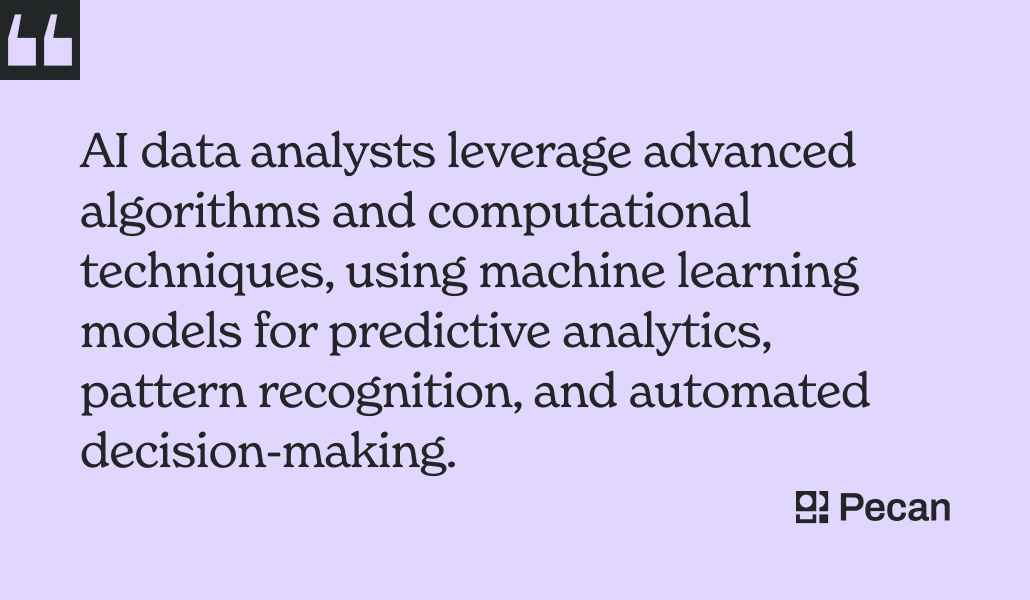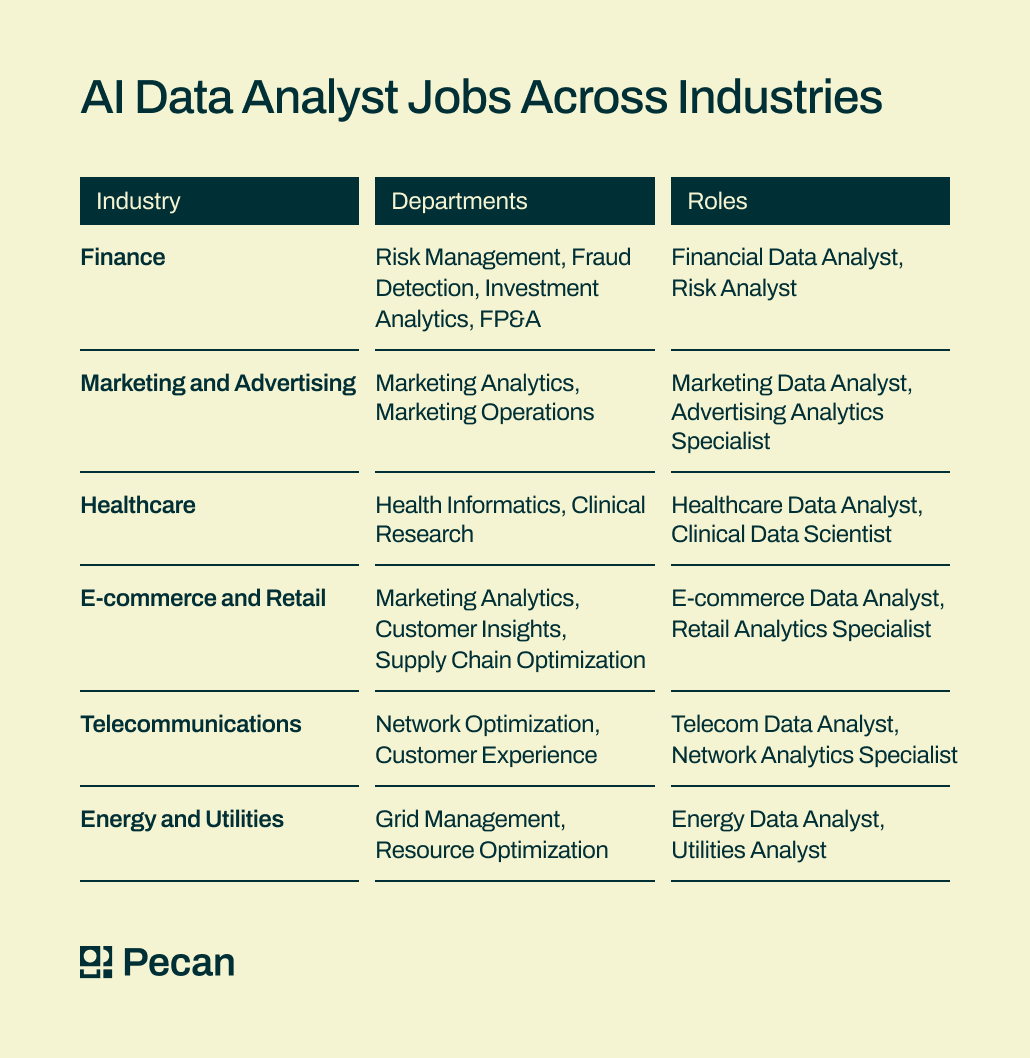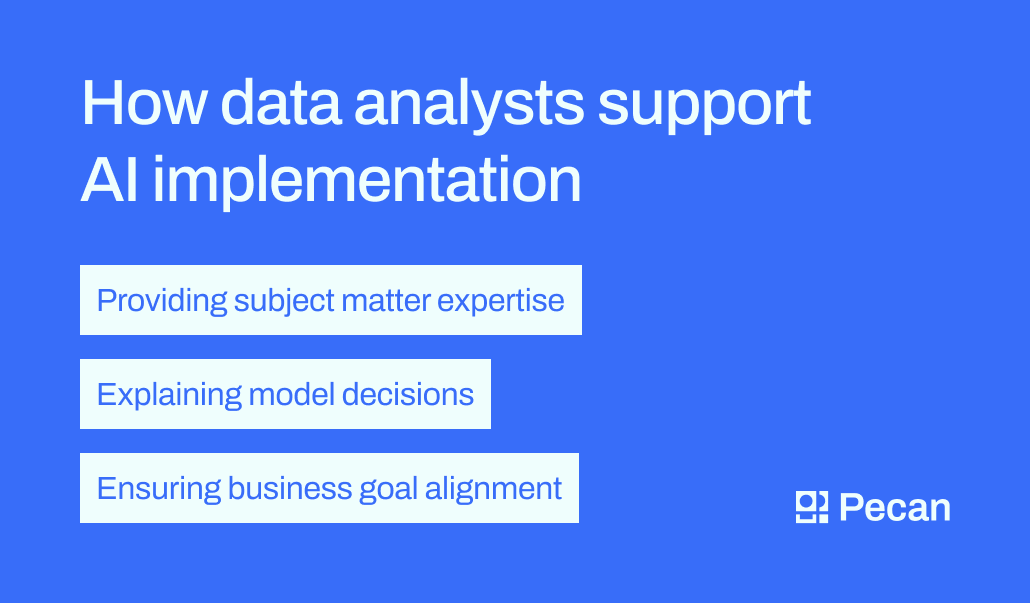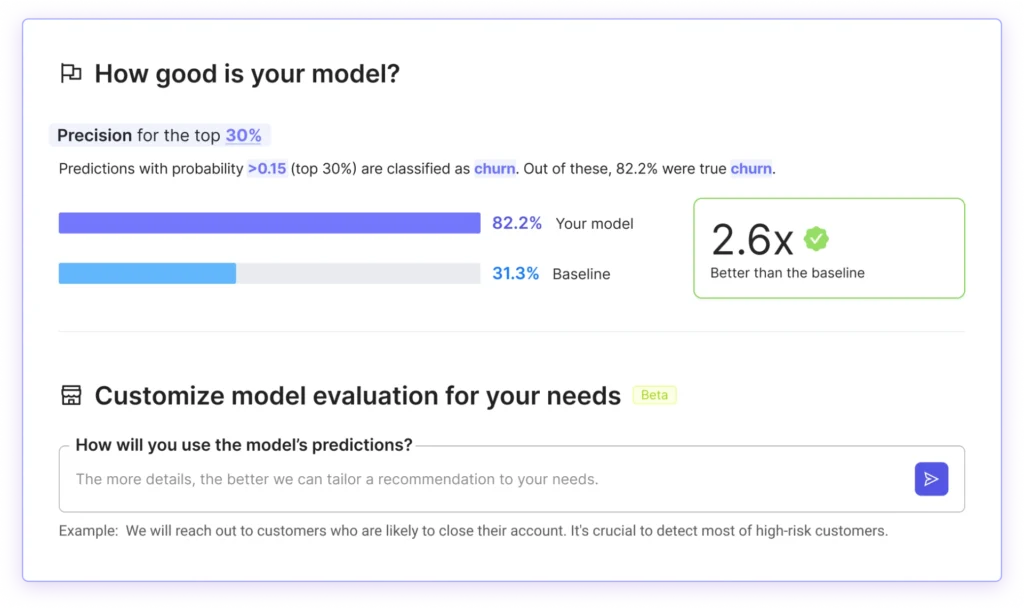In a nutshell:
- The demand for AI data analysts is projected to grow by 23% through 2032.
- AI data analysts combine traditional data analysis skills with expertise in AI and machine learning.
- They use advanced algorithms and computational techniques to extract insights and predict future trends.
- AI data analyst jobs are available across various industries, including technology, finance, marketing, healthcare, and more.
- The salary outlook for AI data analysts is promising, with a range between $90,000 and $310,000.
Good news for AI data analysts: The U.S. Bureau of Labor Statistics projects a remarkable 23% growth in related roles through 2032, marking this highly sought-after career an extraordinary opportunity for those seeking to pursue it.
The high demand for analysts isn’t anything new. Data analytics traces back to 18,000 BCE when people made notches to record supplies and trade activity. Leap ahead to today where the advent of the Internet plus the big data boom made it possible to digitally store and analyze huge sets of data.
Now, the intersection of data science and artificial intelligence (AI) is reshaping data analytics — and demand is higher than ever. As the need for skilled professionals capable of extracting meaningful insights soars, the role of an AI data analyst reigns as a dynamic and fruitful career option.
In this blog post, we get into the weeds of the exciting career path of an AI data analyst, exploring the transformative impact AI has on traditional data analysis methods. Returning to the basics, we provide answers to your key questions, highlighting why putting two letters (AI) in front of your title (data analyst) could mean a lot more than capitalizing on a disruptive trend.
What is an AI data analyst? Is this a promising job in the age of AI?
Imagine two data analysts dissecting the performance of a recent marketing campaign at an e-commerce company.
While one relies on traditional data analysis methods, calculating summary statistics and examining correlations, the AI data analyst uses the newest technology at their disposal. By incorporating automated machine learning (AutoML) and low-code advanced statistical techniques, they unlock deeper insights from complex datasets in minutes, surpassing their traditional counterparts. Imagine gaining hours back in your day and access to new analytic possibilities, not just once, but every day.
AI data analysts combine classic data analysis skills with expertise in AI and machine learning. The promise lies in their ability not only to interpret historical data but also to predict future trends, expediting and improving decision-making across business teams.
AI data analysts have an exciting, evolving role
What does an AI data analyst do?
In a nutshell, an AI data analyst integrates traditional data analysis skills with AI and machine learning expertise. Unlike their traditional counterparts, AI data analysts leverage advanced algorithms and computational techniques, using machine learning models for predictive analytics, pattern recognition, and automated decision-making. The ability to predict future trends positions them as game-changers in various industries, from finance to healthcare.
Whether your goal is to rise through the ranks and become a chief data officer (CDO) or a senior individual contributor, a thorough understanding of AI is advantageous but increasingly essential.
With AI playing an increasingly pivotal role in shaping data-driven strategies, CDOs and analysts well-versed in AI are better equipped to manage and incorporate evolving skills within the world of data analytics and build actionable insights.
What is AI analytics?
For many real-world problems, it's much easier to gather data or figure out how something should behave rather than write a program from scratch. That’s according to Andrej Karpathy, computer vision expert with Open AI and formerly director of AI at Tesla.
Similarly, AI and machine learning come in handy because they can learn and adapt by themselves based on your data. It's a smarter and more flexible way to build models compared to traditional coding. Instead of you finding insights on your own, AI provides insights to help you use AI to find insights.
AI and analytics help you understand what happened in the past, anticipate what might happen in the future, and prescribe actions to optimize outcomes.
AI data analysts have opportunities in many fields
Where are AI data analyst jobs?
The beauty of AI data analyst jobs is their demand across industries. Every company has data and needs talent to make sense of it. So, they’re increasingly investing in AI and analysts to streamline and improve business processes. From technology to finance, marketing, healthcare, e-commerce, telecommunications, and energy, AI data analysts are invaluable.
Note that subject matter expertise, industry-specific knowledge, and familiarity with the business context can be significant advantages for an AI data analyst.
Here’s a high-level overview of all the ways AI data analyst jobs can manifest across industries:
Technology:
- Departments: Data Science, Analytics, Research & Development
- Roles: AI Data Analyst, Machine Learning Analyst, Data Scientist
Finance:
- Departments: Risk Management, Fraud Detection, Investment Analytics, FP&A
- Roles: Financial Data Analyst, Risk Analyst
Marketing:
- Departments: Marketing Analytics, Marketing Operations
- Roles: Marketing Data Analyst, Advertising Analytics Specialist
Healthcare:
- Departments: Health Informatics, Clinical Research
- Roles: Healthcare Data Analyst, Clinical Data Scientist
E-commerce and Retail:
- Departments: Marketing Analytics, Customer Insights, Supply Chain Optimization
- Roles: E-commerce Data Analyst, Retail Analytics Specialist
Telecommunications:
- Departments: Network Optimization, Customer Experience
- Roles: Telecom Data Analyst, Network Analytics Specialist
Energy and Utilities:
- Departments: Grid Management, Resource Optimization
- Roles: Energy Data Analyst, Utilities Analyst
What is the salary of an AI data analyst?
The salary outlook for AI data analysts is promising, with a range between $90,000 and $310,000, reflecting the growing demand for AI expertise. As these roles gain prominence, professionals in this field can expect rewarding prospects, as evidenced by salary surveys encompassing data scientists and AI professionals.
Here’s what you can expect:
Data science
- Individual contributor: between $90,000 and $145,000
- Managerial position: between $155,000 and $275,000
- Top of the field: $310,000, with a 13% annual increase
AI professionals
- Individual contributor: between $105,000 and $175,000
- Managerial position: between $167,000 and $275,000
- Top of the field: $300,225, with a 9% annual increase
Do AI data analysts code?
Yes, most AI data analysts do know code. Proficiency in SQL for data extraction and loading is usually a requirement for AI data analysts. SQL is commonly used for database management and allows analysts to query and manipulate data.
However, familiarity with complex coding languages like Python or R is not mandatory. AI data analysts are more likely to handle tasks related to data extraction and loading using SQL rather than engage in coding with Python or R.
This distinction in coding skills reflects a specific focus on data handling and analysis rather than the broader spectrum of programming associated with data science.
What are good tools for AI data analysts?
AutoML and other AI solutions further equip data analysts with critical skills, fostering automation and efficiency in the data analytics process.
Data notebooks like Hex and Deepnote provide collaborative environments for seamless teamwork, while Predictive GenAI data notebooks like Pecan help you quickly understand your predictive questions and build a model in just minutes.
Whether you're just starting or already well-versed, there are tools that cater to every skill level:
- Hex: Hex stands out as a collaborative data science platform, fostering teamwork on data analysis and machine learning projects. With features like version control, sharing capabilities, and real-time collaboration, Hex streamlines teamwork, enabling multiple data analysts or scientists to seamlessly collaborate on the same project.
- Deepnote: Another valuable tool in this space is Deepnote, a collaborative platform for data science and machine learning. Its web-based environment empowers users to create, edit, and run Jupyter notebooks. Designed for simplicity and collaboration, Deepnote allows team members to work on the same notebook simultaneously, making it an effective tool for collaborative data analysis and model development.
- Pecan: Integrated generative AI capabilities help you quickly understand your business problem, predictive question, and which model is best. Then, Pecan automatically generates the SQL that will define the training set for your predictive model. You can dig into the specifics of the code, enhance your model with additional data, and even ask the AI assistant anything — like what’s happening in portions of the code or what happens if you tweak a certain parameter — to facilitate easy comprehension and execution.
AI data analysts can upskill themselves with many of these AI solutions, gaining access to machine-learning models through AI.
Beyond personal growth, there's a direct benefit to your organization. Many data analytics teams contend with substantial request queues for new reports, dashboards, and analytics projects, often prioritizing only the most critical initiatives.
AI steps in to automate and expedite various stages of the data analytics process, empowering you and your team to deliver essential insights to a broader audience of business stakeholders.
How does subject matter expertise help AI data analysts?
Data analysts interpret data, bringing qualitative insights and contextual information that AI alone may overlook. Subject matter expertise in selecting the right data, business problem, and model plays a pivotal role in ensuring the analysis aligns with the end goal.
Moreover, AI data analysts excel at interpreting the outcomes of AI-powered models, translating complex results into actionable insights. While AI can automate certain aspects of model selection and building, the interpretability and application of insights remain a uniquely human activity.
AI data analysts are pioneers in their organizations
Data analysts bridge this gap by providing essential context, explaining model decisions, and ensuring that the generated insights align seamlessly with the overarching business goals.
All this to say, data analysts are not only best positioned to work with their team’s data and address real business problems, but they also bring a unique perspective to the table.
With a low-code Predictive GenAI platform like Pecan, data analysts can incorporate AI into their daily work, leveraging their subject matter expertise to bring a human touch to their analytics.
How do I become an AI data analyst?
We saved the best for last. Embarking on the path to becoming an AI data analyst is a rewarding endeavor — and we're here to help. Our platform offers an accessible low-code AI solution to help you capitalize on your existing data and domain expertise.
Whether you're a beginner or a seasoned professional, Pecan helps you build models in minutes — and the results are worth it. Becoming an AI data analyst opens doors to new career opportunities as you provide valuable insights and guide your organization forward.
Ready to take the plunge as an AI data analyst? Sign up for a free trial of Pecan’s Predictive GenAI platform, and start building your own AI model now. Or, if you'd prefer a guided tour, get in touch.







